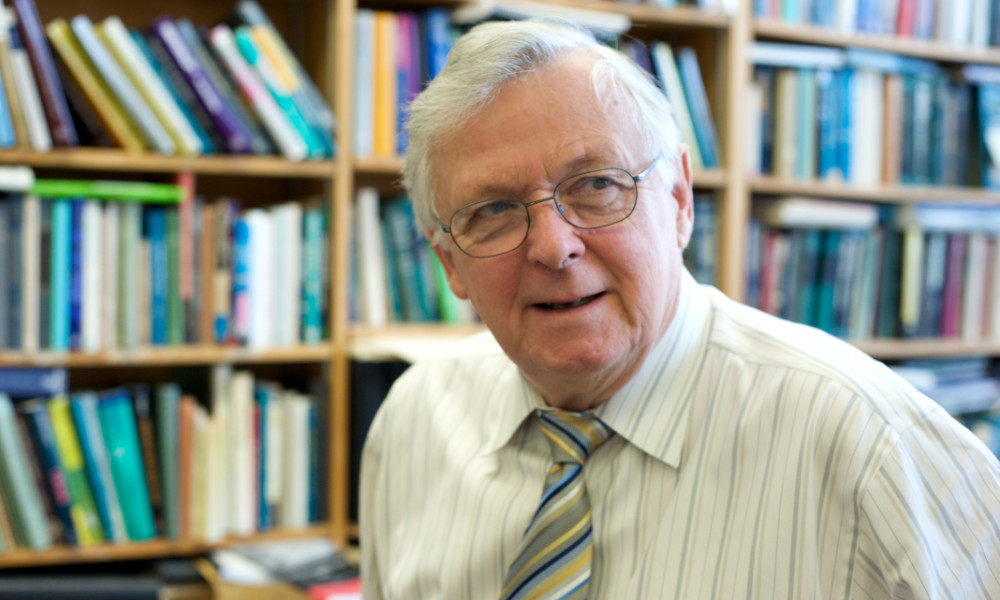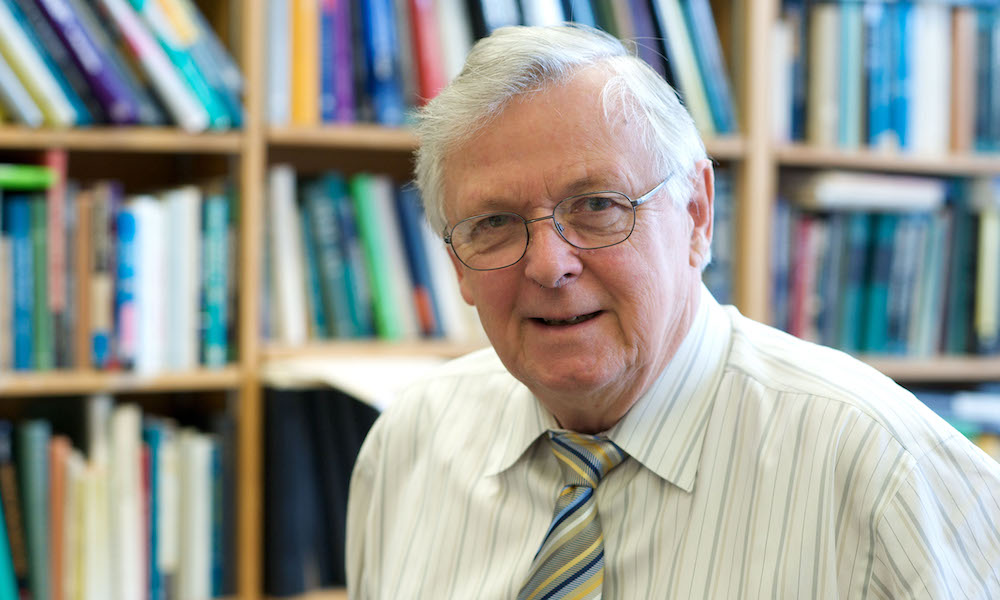The professor emeritus helped establish the University’s PhD program in economics.
Ronald Jones, a professor emeritus in the Department of Economics at the University of Rochester, is being remembered as a leading figure in the field of international economics. Jones died in September at the age of 91.
“Ron Jones was not only a world-class scholar who made significant contributions to the theory of international trade,” says Professor Emeritus Stanley Engerman, “he was a pivotal figure in turning the department into one of the world’s leading places to conduct economic research.”
Jones joined the Rochester faculty in 1958, two years after earning his PhD from the Massachusetts Institute of Technology. That was the year the economics department became its own academic unit, after having separated from the business administration program, and Jones was one of the eager, young scholars brought in during the first year to begin building up the department.
And that’s exactly what he did over the course of his career.
As former department chair George Alessandria puts it, “Ron was a giant in the field of international economics. By offering a clear and disciplined approach that is the basis for most work today, he changed the way we study global interactions.”
Much of Jones’s work is summarized in his 2000 book, Globalization and the Theory of Input Trade (MIT Press), in which he examined the recent tendency of firms to outsource parts of the production process to other areas of the globe. Outsourcing of labor-intensive activities to regions with lower wages (relative to productivity) is a prime example of this process. Jones found that for an advanced country, this kind of outsourcing need not prove harmful to labor.
Says Gloria Culver, dean of the School of Arts and Sciences, “Ron’s role in helping to create this noted department and his role in international economics cannot be overstated.”
Making his mark in international economics
Jones has 180 scholarly articles to his name, many in the leading economics journals the American Economic Review, the Review of Economic Studies, and the Journal of Economic Theory. His several books include World Trade and Payments, (Little Brown & Co.), one of the leading undergraduate textbooks in trade, coauthored with Richard Caves. The book first appeared in 1973 and went through 10 editions, a testament to its popularity. It was followed by International Trade: Essays in Theory (North Holland, 1979), and Globalization and the Theory of Input Trade (MIT Press, 2000). He is perhaps best known for his 1965 Journal of Political Economy article, “The Structure of Simple General Equilibrium Models.”
Carsten Kowalczyk ‘88 (PhD), an associate professor of international economics at Tufts University, wrote the forward to Jones’s 2018 book, International Trade Theory and Competitive Models (World Scientific Publishing Company). “At this time of questioning of international trade and the associated policies and institutions, there is a great need for the kind of cool and powerful economic analysis that Jones offers,” observed Kowalczyk. “The timing of publication of this volume is indeed fortuitous.”
An extraordinary colleague
Colleagues remember Jones not just as a brilliant economist but also as a consummate faculty member. “His research was original and influential, his teaching was inspiring, his mentorship was highly sought after, his dedication to the department was unparalleled, and his willingness to talk with colleagues was never exhausted,” says Michael Wolkoff, the associate chair of the department.
And Mark Bils, the Hazel Fyfe Professor in Economics, credits Jones with helping shape the economics department from its very beginning. “Ron was devoted to the department, especially to its many graduate students. And he did everything with style.”
Doing it with style
Jones’s style made an impression on Kajal Lahiri ’74 (MA), ’75 (PhD), now a Distinguished Professor of Economics, and Health Policy, Management & Behavior at the State University at Albany. “I still vividly remember him in his trade theory classes in 1972 with his typical scarf on,” says Lahiri. “He used to look like Paul McCartney.”
Another former student recalls Jones’s “beautiful” pedagogy. “His interpretation of the Heckscher-Ohlin-Samuelson model was simply beautiful,” says Robert Flood ’75 (MA), ’77 (PhD), a professor emeritus at the University of Notre Dame. “At Rochester in the ’70s, the room set for his graduate trade course was always filled to overflowing with economics students and faculty. Some students took the course for credit, while faculty just wanted to see a master at work.”
But faculty didn’t always agree with Jones, and those moments provided some of Flood’s best memories. “I fondly remember the wonderful fights between Ron and (assistant professor of economics) Bob Fogel, says Flood. Ron believed fervently in the gains from trade. Bob thought of our being born on Ron’s contract curve – so one person’s gain is another’s loss.” According to Flood, “Ron was right and the coffee-room discussions proved it. Everyone gained from the wonderful ideas and discussions Ron brought to the department.”
Honors and awards
Jones was a Distinguished Fellow of the American Economic Association, a Fellow of the Econometric Society, the American Academy of Arts & Sciences, and the National Academy of Sciences. The recipient of the 1994 University Award for Excellence in Graduate Teaching, he was awarded honorary doctoral degrees from six institutions, including the Warsaw School of Economics, Athens University of Economics and Business, and the Stockholm School of Economics.
Jones is survived by his wife, Catherine, five children, ten grandchildren, and two great-grandchildren.
- Visit the Ronald W. Jones Memorial Page to share memories and condolences.
Read more
 Long-standing economics seminar series renamed to honor Professor Emeritus Ronald Jones
Long-standing economics seminar series renamed to honor Professor Emeritus Ronald JonesThe Ronald W. Jones Seminar in International Economics honors the Rochester economist’s six decades of work in the field of economics.
 3 surprising ways COVID-19 has rocked the US labor market
3 surprising ways COVID-19 has rocked the US labor marketFor Rochester economist Lisa Kahn, whose research focuses primarily on labor economics, the past year and a half has been nothing short of astonishing. She explains why.
 Expect another year of supply chain issues
Expect another year of supply chain issuesRochester economist George Alessandria explains what is causing the shortages—and why government intervention would be counterproductive.





